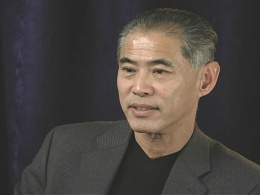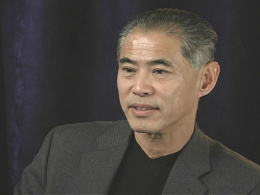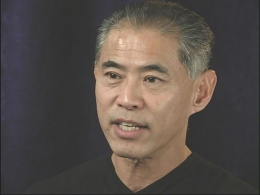Dale Minami
| Name | Dale Minami |
|---|---|
| Born | 1946 |
| Birth Location | Los Angeles |
| Generational Identifier |
Civil rights lawyer and lead attorney for Fred Korematsu's coram nobis legal team.
Early Life and Law School
Dale Minami (1946 - ) was born in Los Angeles and raised in nearby Gardena, where he was student body president of his high school. During his youth, Minami's parents rarely talked about their experiences at the Rohwer concentration camp. While a student at USC in the late-1960s, his interest in the wartime incarceration grew because of the civil rights movement and the rise of ethnic consciousness.
Minami received a B.A. in political science from USC in 1968. He seriously considered pursuing a Ph.D. in social psychology but decided to attend the University of California's Boalt Hall School of Law (now Berkeley Law). He began law school during a time of intense political activity when the anti-war, counterculture, civil rights, ethnic awareness and ethnic studies movements converged in the San Francisco Bay Area. Minami learned from these social movements as much as he did in the classroom, and the political fervor of the era shaped his perspectives about practicing law.
Two years after he was admitted to Boalt Hall, the law school instituted an affirmative action program. Minami noticed a marked increase in students of color, including Asian Americans. He became active with an Asian American law students' organization and supported efforts to diversify the school.
While in law school he studied the Korematsu and Hirabayashi U.S. Supreme Court decisions and found the court's reasoning to be flawed. He recognized that the opinions were more political than legal. The decisions also angered him because they had a direct impact in justifying the imprisonment of his family during the war.
Founding Asian Law Caucus and Opening His Own Firm
After he graduated from law school in 1971, Minami and other Asian American law students and recent graduates started a collective to help poor Asian Americans in the San Francisco Bay Area with legal problems. In the summer of 1972, they opened an office in Oakland for the Asian Law Caucus, the first legal services non-profit for Asian Americans in the U.S.
Minami recognized that the law could be used as a political tool to educate the public about civil rights and to organize and empower communities to demand their rights. So the Asian Law Caucus not only represented clients in lawsuits but also raised public awareness about discrimination against Asian Americans.
In 1975, Minami and other Asian Law Caucus founders formed their own law firm. During their early years in private practice, they handled many criminal defense cases. But they were also involved in a number of cases important to Asian Americans, such as representing Wendy Yoshimura , a Shin-Issei who was arrested for her connection with the radical Symbionese Liberation Army; defending demonstrators who protested the demolition of San Francisco's International Hotel, the home of elderly Filipino workers; and filing civil rights cases against the San Francisco Police Department for racial profiling of young Chinese Americans, and a class action lawsuit on behalf of the Spokane chapter of the Japanese American Citizens League (JACL) against Washington State University for failing to offer Asian American Studies courses. These pro bono cases were financed by Minami's expertise in personal injury and wrongful death lawsuits, an area in which he still practices.
Involvement in Redress Movement
In the early 1970s, Minami joined the San Francisco JACL chapter, then led by Edison Uno , an early advocate for monetary redress for Japanese Americans. In 1974, Uno asked Minami for a legal analysis of the mass incarceration to determine if there was a basis for a lawsuit for damages. Minami recommended a legislative rather than a judicial route for redress.
As the movement for redress gained momentum, Minami was an active member of Bay Area Attorneys for Redress (BAAR), which submitted a brief to the Commission on Wartime Relocation and Internment of Civilians (CWRIC) on the constitutional rights violated by the incarceration of Japanese Americans.
Korematsu Coram Nobis Case
In 1981 attorney and professor Peter Irons and researcher Aiko Yoshinaga-Herzig discovered documents in the National Archives proving that government lawyers during World War II had intentionally suppressed and altered evidence in the lawsuits of Fred Korematsu, Gordon Hirabayashi , and Minoru Yasui . Irons believed that the men could reopen their cases. Knowing he could not take on the cases alone and believing it was important for Asian American attorneys to lead the effort, Irons sought out Asian American lawyers. Through a referral from Yasui and fellow Nisei attorney Frank Chuman , Irons contacted Minami and explained the evidence he had discovered. Initially Minami was skeptical and wondered if Korematsu, Hirabayashi and Yasui were even still alive.
Minami arranged a meeting of BAAR members and others for Irons to present his evidence and to explain an obscure legal process called the writ of error coram nobis through which individuals who had been convicted and served their sentences can reopen their cases. Minami and the others at the meeting were stunned by the documents Irons discovered and considered them a "smoking gun" proving governmental wrongdoing.
After Korematsu, Hirabayashi and Yasui agreed to the coram nobis process, Minami reached out to lawyers in Seattle, Portland, and San Francisco who were eager to work on the three Nisei's legal teams. The attorneys decided to file three separate cases in the original venues in which each Nisei had been convicted, rather than a consolidated appeal, because it increased their chances of winning.
Minami served as the coordinating attorney for all three cases—focusing on legal and political strategies—and he was also the lead counsel for Korematsu's legal team in San Francisco.
Minami and the other attorneys understood that the coram nobis cases were a powerful means to educate the American public about the wartime incarceration of Japanese Americans, the lack of military necessity for the mass imprisonment, and the movement for redress. However, they also realized that losing the cases could set back the redress effort.
As lead attorney for Fred Korematsu, Minami dealt directly with the government's attorney and with Judge Marilyn Hall Patel , who was assigned to hear Korematsu's coram nobis appeal. Because the government could not come up with a coherent response to Korematsu's coram nobis petition, Judge Patel indicated she would overturn Korematsu's conviction. However the question remained whether she should issue a judicial declaration indicating that Korematsu's criminal conviction was wrong.
At a case hearing, attended by hundreds of Nikkei camp survivors, Minami delivered a powerful statement rejecting the government's position that Judge Patel should let bygones be bygones and not issue a statement. Minami argued that the public interest compelled Judge Patel to issue a statement not only for Fred Korematsu, who had lived with the burden of his criminal conviction for 40 years, but for the thousands of Nikkei who suffered tremendous financial, psychological and emotional losses because of the mass incarceration.
Patel surprised the courtroom by not only overturning Korematsu's conviction but stating that the exclusion orders Korematsu violated were based on unsubstantiated facts, distortions and the assertions of at least one military commander whose views were seriously infected by racism.
Work on Other Civil Rights Cases and Civic Engagement
Minami has worked on other important civil rights cases including United Pilipinos for Affirmative Action v. California Blue Shield , the first class action employment lawsuit brought by Asian Pacific Americans on behalf of Asian Pacific Americans; and Nakanishi v. UCLA , a successful claim for unfair denial of tenure that resulted in the granting of tenure after widespread publicity over racial discrimination in academia.
In the aftermath of 9/11, Minami again represented Fred Korematsu, this time in submitting an amicus brief in the 2003 lawsuits Odah v. United States , Rasul v. George W. Bush , and Hamdi v. Donald Rumsfeld , challenging the federal government's indefinite detention without trials of Muslim, Middle Eastern, and South Asian men.
In 1996, President Bill Clinton appointed Minami as chair of the Civil Liberties Public Education Fund , a federal entity established through the same legislation granting redress to individual Japanese Americans who had been incarcerated during World War II. The Fund awarded grants for projects to educate Americans about the wartime incarceration.
Minami has served as a member of the California Fair Employment and Housing Commission and has chaired the California attorney general's Asian Pacific Advisory Committee, advising the state's attorney general on key issues. He has also served as on the State Bar's Commission on Judicial Nominee's Evaluation, and on California Senator Barbara Boxer's Judicial Screening Committee, which makes recommendations for federal judicial appointments.
He is a co-founder of the Asian American Bar Association of the Greater Bay Area, the first Asian American Bar Association in the United States; the Asian Pacific Bar of California; and the Coalition of Asian Pacific Americans, one of the nation's first political action committees focused on Asian American candidates and issues.
For More Information
Dale Minami's website: http://daleminami.com .
Dale Minami biography, Minami Tamaki LLP website: http://www.minamitamaki.com/attorneys/daleminami/ .
Dale Minami, interviewed by Tom Ikeda and Margaret Chon, February 8, 2003, Seattle Washington. Densho Digital Repository. http://ddr.densho.org/interviews/ddr-densho-1000-141-1/ .
Last updated Jan. 16, 2018, 5:23 p.m..

 Media
Media

